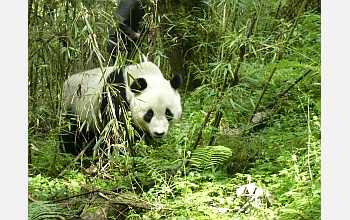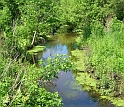News Release 07-144
NSF Awards 12 Grants for Research on Coupled Natural and Human Systems
Scientists, engineers, educators will study natural processes and human behavioral interactions

Scientists will conduct research on the interaction of pandas, humans and ecosystems in China.
October 16, 2007
This material is available primarily for archival purposes. Telephone numbers or other contact information may be out of date; please see current contact information at media contacts.
To better understand the interactions between humans and their environment, the National Science Foundation (NSF) has awarded 12 grants to scientists, engineers and educators across the country to study coupled natural and human systems.
Research conducted through NSF's Dynamics of Coupled Natural and Human Systems (CNH) program, in its first year as a multidirectorate program, will provide a better understanding of natural processes and cycles, human behavior and decisions, and how they interact.
The CNH program is supported by NSF's directorates for biological sciences; geosciences; and social, behavioral and economic sciences.
"Improved models for understanding how the geosphere, biosphere and atmosphere are interconnected will rely on research like that supported in CNH projects," said James Collins, NSF assistant director for biological sciences. "The focus of these projects is on uncovering the strong and weak forces that link a wide range of ecosystems. In all these ecosystems, humans play an increasingly important role."
"These projects demonstrate the importance of extending beyond traditional scientific disciplinary boundaries to understand the impacts and drivers of environmental processes," added Jarvis Moyers, acting NSF assistant director for geosciences,
"The awards represent a wonderful range of studies of human behavior as it both causes environmental change and responds to it," said David Lightfoot, NSF assistant director for social, behavioral and economic sciences. "They encompass the behavior of individuals, groups, and institutions, from fishers to suburban households to government agencies."
For example, CNH awardee Arun Agrawal of the University of Michigan and colleagues will study the effects of government changes on logging and forest cover in some of the most valuable and threatened rainforests on Earth--in the Congo Basin in Central Africa. The scientists will analyze and explain how changing environmental governance mechanisms have affected logging and forest-cover change in Cameroon and the Republic of Congo, two countries in the Congo Basin.
The multidisciplinary team of investigators will seek answers to two main questions:
- How do variations in partnerships among country governments, logging companies, and third parties such as NGOs (non-governmental organizations) affect agreements, practices and environmental outcomes related to logging concessions?
- How do armed conflict, shifts in trade and currency values, and increasing monitoring of and information on logging practices, forest-cover change, and associated outcomes modify the impacts of new and evolving governance arrangements?
Another CNH project will address the effects of cross-boundary processes on human-nature dynamics in China's Wolong Nature Reserve for giant pandas. Scientist Jianguo (Jack) Liu of Michigan State University and colleagues hope to shed light on that interaction through their CNH award. Successfully balancing wildlife conservation and human well-being requires knowledge of processes operating not only within a particular coupled human-natural system, such as a nature reserve, Liu believes, but also of processes operating across system boundaries.
This project will contribute to a better understanding of the effects of these interacting processes on the coupled human-natural system (forests, panda habitat and local residents) in the Wolong Nature Reserve, the flagship reserve for conservation of the world-famous endangered giant pandas of China. The project will contribute to improved policies for the conservation of panda habitat in Wolong, providing insights for designing plans that balance the needs of panda conservation and economic development in the world's most populous nation.
CNH grantee Colin Polsky of Clark University and colleagues will study suburbanization in coastal zones and its effects on water use, nitrogen cycling and eutrophication along the Massachusetts coast. Suburbanization in coastal regions can lead to severe environmental impacts, Polsky believes, including estuarine eutrophication and the degradation of shellfish resources. It can also produce substantial social disruptions, as established populations--and their contributions to society and the economy--are replaced by new populations and land uses. Polsky and colleagues will provide new insights into the processes that govern suburbanization, water use, nitrogen cycling, shellfish productivity and their interactions. These dynamics are a pressing national problem for coastal zone managers, land owners and water managers.
Other projects in this year's CNH awards include studies of:
- the impact of economic globalization on human demography, land use, and natural systems in Latin America and the Caribbean (T. Mitchell Aide, University of Puerto Rico and colleagues);
- the integration of human choice into models of biogeochemical cycling in urban ecosystems (Lawrence Baker, University of Minnesota);
- coupling hydrologic, economic and social network models to improve understanding of surface water-groundwater interactions for protection of in-stream flows (Nicholas Brozovic, University of Illinois);
- dynamic interactions among people, livestock, and savanna ecosystems under climate change (David Campbell, Michigan State University);
- direct and indirect coupling of fisheries through economic, regulatory, environmental and ecological linkages (Daniel Holland, Gulf of Maine Research Institute and colleagues);
- understanding the importance of weak-tie networks in complex environment systems: ecosocial feedback in multifunctional agriculture (Nicholas Jordan, University of Minnesota);
- interactions between changing climate and technological innovations in agricultural decision-making: implications for land-use and sustainability (Guillermo Podesta, University of Miami and colleagues);
- pre-contact intensive agriculture and society in Kohala, Hawaii (Peter Vitousek, Stanford University and colleagues); and
- dynamic coupling of the water cycle and patterns of urban growth (Claire Welty, University of Maryland and colleagues).
-NSF-
-
Researchers will study human effects on fisheries.
Credit and Larger Version -
Suburban land-use patterns and how they affect river flows will be studied by grantees.
Credit and Larger Version
Media Contacts
Cheryl Dybas, NSF, (703) 292-7734, email: cdybas@nsf.gov
Related Websites
NSF Dynamics of Coupled Natural and Human Systems Program: http://www.nsf.gov/funding/pgm_summ.jsp?pims_id=13681&from=fund
The U.S. National Science Foundation propels the nation forward by advancing fundamental research in all fields of science and engineering. NSF supports research and people by providing facilities, instruments and funding to support their ingenuity and sustain the U.S. as a global leader in research and innovation. With a fiscal year 2023 budget of $9.5 billion, NSF funds reach all 50 states through grants to nearly 2,000 colleges, universities and institutions. Each year, NSF receives more than 40,000 competitive proposals and makes about 11,000 new awards. Those awards include support for cooperative research with industry, Arctic and Antarctic research and operations, and U.S. participation in international scientific efforts.
Connect with us online
NSF website: nsf.gov
NSF News: nsf.gov/news
For News Media: nsf.gov/news/newsroom
Statistics: nsf.gov/statistics/
Awards database: nsf.gov/awardsearch/
Follow us on social
Twitter: twitter.com/NSF
Facebook: facebook.com/US.NSF
Instagram: instagram.com/nsfgov




